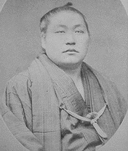Umegatani Tōtarō I
| Umegatani Tōtarō I | |
|---|---|
| 梅ヶ谷 藤太郎 | |
 | |
| Personal information | |
| Born |
Tōtarō Oe March 16, 1845 Asakura, Fukuoka, Japan |
| Died | May 15, 1928 (aged 83) |
| Height | 1.76 m (5 ft 9 1⁄2 in) |
| Weight | 105 kg (231 lb) |
| Career | |
| Stable | Ikazuchi |
| Record |
116-6-78 18 draws-2 holds(Makuuchi) |
| Debut | March, 1871 |
| Highest rank | Yokozuna (February, 1884) |
| Retired | May, 1885 |
| Championships | 9 (Makuuchi, unofficial) |
| * Up to date as of September 2007. | |
Umegatani Tōtarō I (梅ヶ谷 藤太郎, March 16, 1845 – May 15, 1928) was a sumo wrestler from Asakura, Fukuoka Prefecture, Japan. He was the sport's 15th yokozuna. He was generally regarded as the strongest wrestler to emerge since the era of Tanikaze and Raiden.
Career
Umegatani entered Osaka sumo in 1863 and was promoted to ōzeki in 1870. He wasn't content with the rank and so gave it up. He transferred to Tokyo sumo in December 1870, and began his career over again from the bottom of the rankings.[1] Umegatani won 58 bouts in a row from January 1876 to January 1881. It is the fourth best record of consecutive victories behind Futabayama, Tanikaze and Hakuhō. He was awarded a yokozuna licence in February 1884, receiving it simultaneously from both the Osaka and Tokyo based organisations. Emperor Meiji took pleasure in seeing his bout on March 10, 1884. The event helped to make sumo more famous among the people of Japan. He won 116 bouts and lost only 6 bouts in the top makuuchi division.[2] He achieved a winning average of 95.1, the highest record among yokozuna,[3] though could not surpass ōzeki Raiden. He was not a particularly large wrestler but was remarkably strong.[2]
Retirement from sumo
After his retirement he remained in the sumo world as a coach under the name Ikazuchi Oyakata. He helped to raise funds for the building of the first Ryōgoku Kokugikan stadium in 1909. It is said that when asked by a potential backer what he had in the way of collateral, simply showing his muscles was enough to clinch the deal.[4]
He lived until the age of eighty-three, making him the longest-lived yokozuna of all time. He outlived his son-in-law Umegatani II, and is one of very few yokozuna to have died of old age.[2]
Top division record
- The actual time the tournaments were held during the year in this period often varied. The spring tournament recorded for 1878 was actually held in December of the previous year.
| - | Spring | Winter |
|---|---|---|
| 1874 | x | West Maegashira #6
8–0–1 1d Unofficial |
| - | Spring Haru basho, varied |
Summer Natsu basho, varied |
||||
|---|---|---|---|---|---|---|
| 1875 | West Maegashira #5
6–1–3 |
Not held | ||||
| 1876 | West Maegashira #4
5–2–2 1d |
West Maegashira #2
3–0–6 1d |
||||
| 1877 | West Maegashira #1
8–0–2 Unofficial |
West Komusubi
7–0–2 1d Unofficial |
||||
| 1878 | West Sekiwake
7–0–1 Unofficial |
West Sekiwake
4–0–4 1d 1h |
||||
| 1879 | West Ōzeki
6–0–1 3d |
West Ōzeki
5–0–4 1h |
||||
| 1880 | West Ōzeki
0–0–6 4d |
West Ōzeki
9–0–1 Unofficial |
||||
| 1881 | West Ōzeki
7–1–1 1d Unofficial |
West Ōzeki
8–0–2 Unofficial |
||||
| 1882 | Sat out | West Ōzeki
5–0–4 1d Unofficial |
||||
| 1883 | East Ōzeki
6–0–4 |
East Ōzeki
3–0–7 |
||||
| 1884 | East Ōzeki
7–0–2 1d Unofficial |
East Ōzeki
7–2–1 |
||||
| 1885 | East Ōzeki
3–0–4 3d |
East Ōzeki
Retired 0–0–10 |
||||
| Record given as win-loss-absent Top Division Champion Retired Lower Divisions Key: d=Draw(s) (引分); h=Hold(s) (預り); nr=no result recorded Yokozuna (not ranked as such on banzuke until 1890) Ōzeki — Sekiwake — Komusubi — Maegashira | ||||||
*Championships for the best record in a tournament were not recognized or awarded before the 1909 summer tournament and the above unofficial championships are historically conferred. For more information see yūshō.
See also
| Wikimedia Commons has media related to Umegatani Tōtarō I. |
References
- ↑ Schilling, Mark (1994). Sumo: A Fan's Guide. Japan Times. ISBN 4-7890-0725-1.
- 1 2 3 Newton, Clyde (1994). Dynamic Sumo. Kodansha. p. 56. ISBN 4-7700-1802-9.
- ↑ Kuroda, Joe (February 2006). "A Shot At the Impossible-Yokozuna Comparison Through The Ages". sumofanmag.com. Retrieved 2008-06-22.
- ↑ Sharnoff, Lora (1993). Grand Sumo. Weatherhill. ISBN 0-8348-0283-X.
- ↑ "Umegatani Totaro Rikishi Information". Sumo Reference. Retrieved 2007-09-27.
| Previous: Sakaigawa Namiemon |
15th Yokozuna 1884–1885 |
Next: Nishinoumi Kajirō I |
| Yokozuna is not a successive rank, and more than one wrestler can share the title | ||